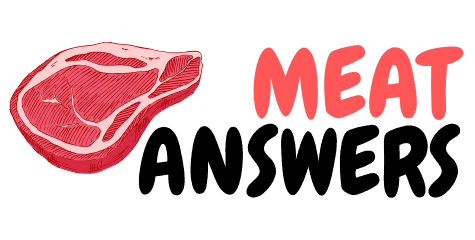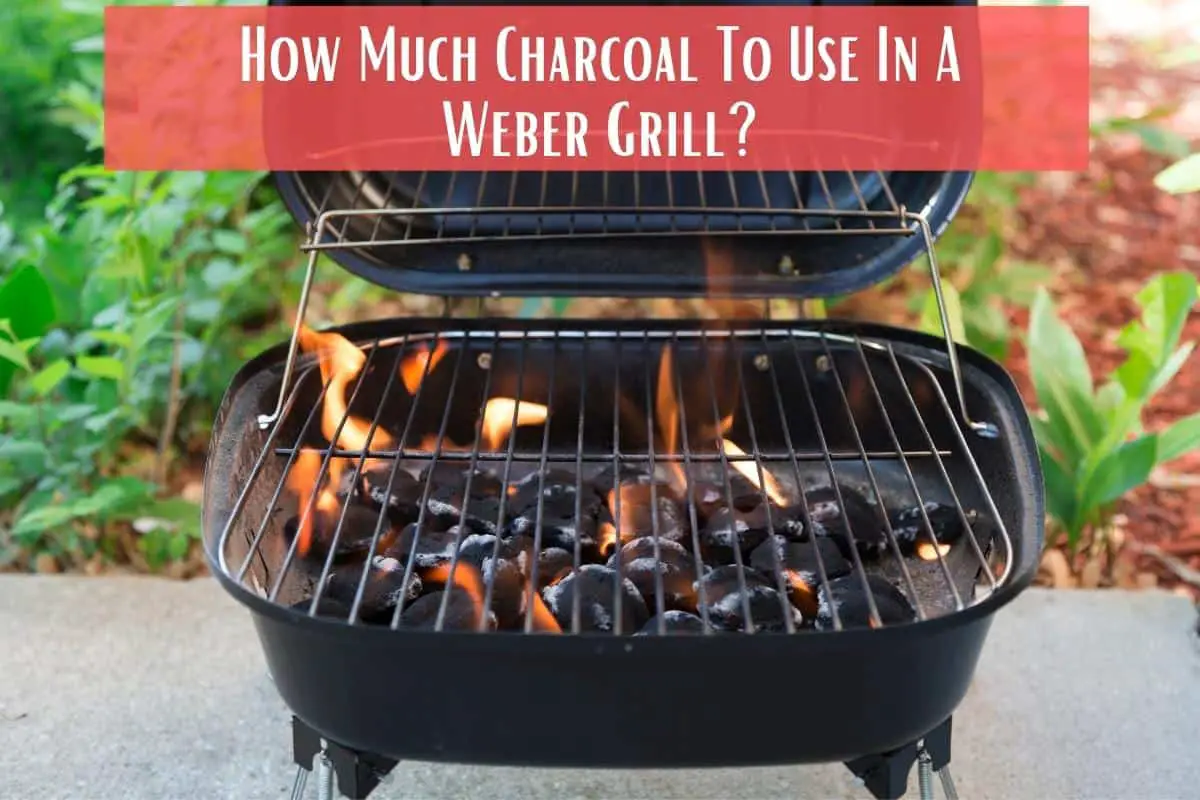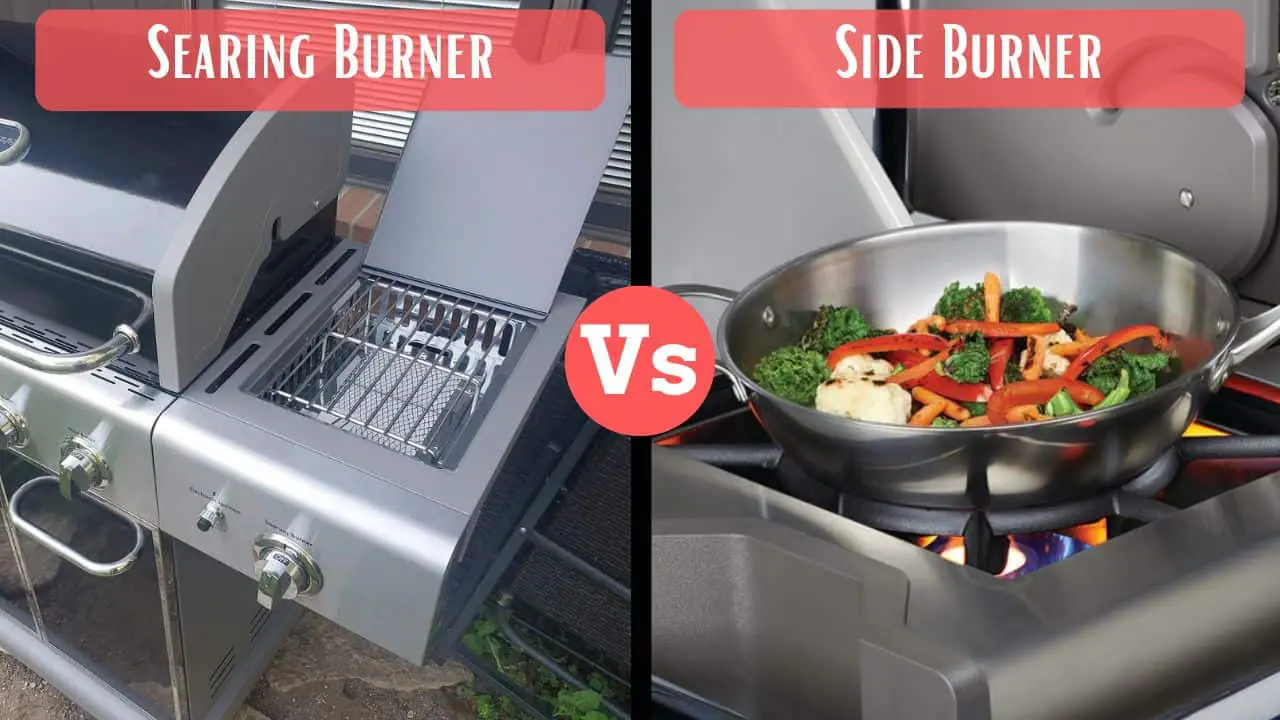After a long period of use, I’ve recently noticed rust spots forming on my grill grates. So, I was wondering if I should replace my grates with new ones or try one or more solutions to get rid of the rust on my grill grates.
Rust formation is common on grill grates, and the good news is that there’s no need to buy new grates, but here are a few simple and easy ways to remove rust from grill grates.
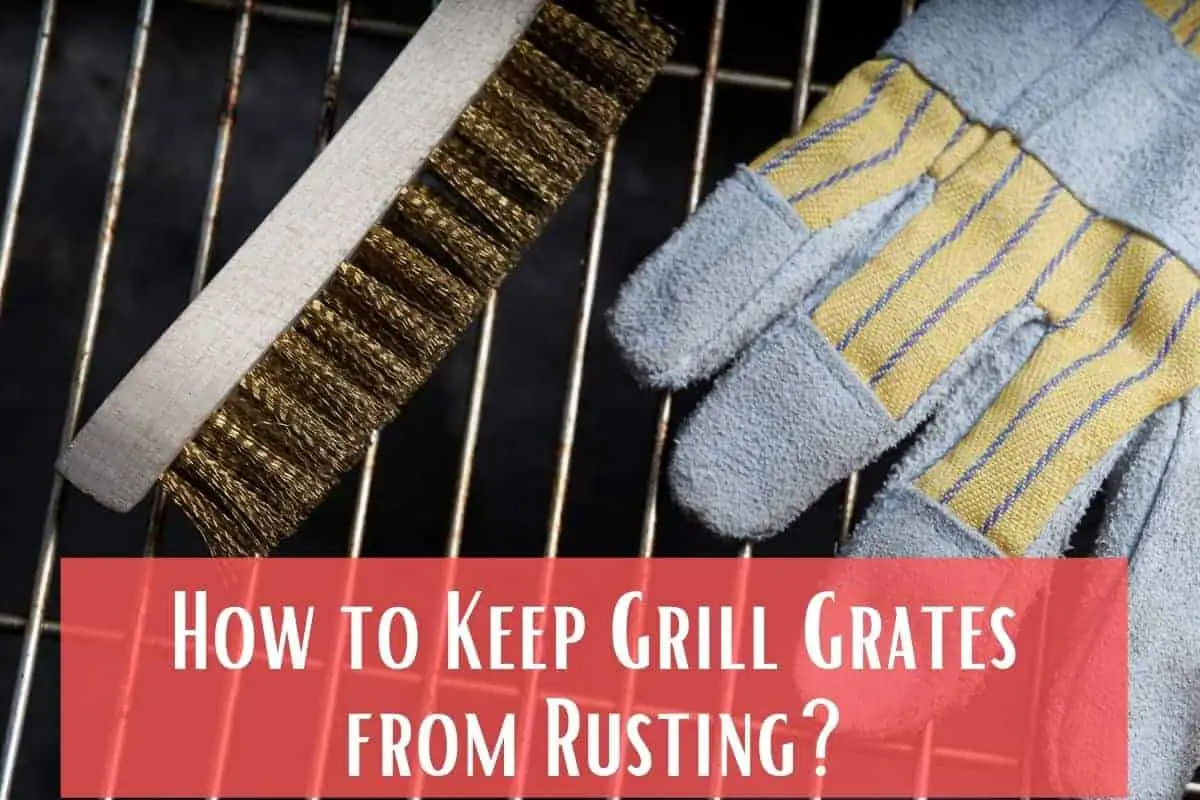
Table of Contents
Why Do Grill Grates Keep On Rusting?
There are several reasons why your grill grates rust, most notably due to the high heat the grates are exposed to. The iron that is unprotected will rust when exposed to air, and the speed at which your grill grates rust depends on heat and moisture.
Moisture in the air as well as moisture in the food as it is cooked causes grill grates to rust more quickly.
Adding to this, food particles, cooked grease leftover or dripping on your grill grates can also lead to rusting.
Cleaning your grill grates with a chlorine-based solution such as bleach breaks down the passive film on the surface of the grates, causing them to rust.
Rust may also appear if the grill grates were not seasoned properly, so you will have to re-season them by following the manufacturer’s instructions.
How to Keep Cast Iron Grill Grates from Rusting?
Apart from seasoning your grill grates annually, and storing them properly in the winter months, here are a few other ways to prevent your grill grates from rusting.
1. Avoid pouring liquids over your grill
While it may not be possible to prevent sauces and other liquids over your grill, try and avoid BBQ sauces and other liquids from getting in contact with your grill’s burners.
You can apply marinades and sauces while preparing your food in the kitchen rather than during grilling.
2. Clean your grill regularly
Although you may feel lazy after a hearty grilling session, it’s a good practice to clean your grill after each use to prevent the grates and the grill from rusting.
Before cleaning your grill, be sure to turn the burners off, and use a grill brush to remove any particles that may be stuck on the grates.
The best time to clean a charcoal grill is while it’s hot using a brush, and a little bit of water. After you clean the grates of the grill and allow the grill to cool, get rid of any remaining ashes or leftover coals in the appliance, and clean the cook box with mild soapy water.
Apart from regular cleaning, manufacturers recommend deep cleaning your grill twice a year or more depending on use.
First, remove the grates, and clean them with a solution of hot water, one cup of mild dish soap, and 1/4 cup of baking soda.
After cleaning the grates with the solution, let them air dry before reinstalling them on the grill.
If you’re an avid griller, you should use a specialized spray to clean the grates of your grill.
3. Oil the grill
After cleaning the grates of your grill, it’s a good idea to coat the grates with a thin layer of vegetable oil to prevent food from sticking to them in the future. Coating the grates with vegetable oil also helps repel moisture, therefore rust.
4. Cover the grill and move it indoors
As I’ve mentioned earlier, moisture is the biggest culprit of rust on the grill grates and grill itself.
After the grilling season is over, cover the grill with a cover, and move it indoors if you have the space.
How to Remove Rust from Grill Grates?
There are several ways to remove rust from grill grates, and the best method depends on the amount of rust on the grates.
1. Using Fat and heat
If you have mild rust spots on your grill grates, you can usually get rid of them by heating your grill for 15 minutes to 20 minutes.
Heating the grill breaks up the iron oxide, making it easier to remove. Once the grill is hot, take a thick of fat and dab it on the rust spots, and repeat until no further pieces of rust are getting stuck to the fat.
But don’t throw away the piece of fat just yet, because you can clean the rust stuck to it, and use it to coat the grates with a protective coating.
2. Using Wire brush, steel wool, or sandpaper
Using an abrasive material is another effective method of scraping rust from grill grates. You can use this method in combination with any of the following solutions to remove rust from grill grates.
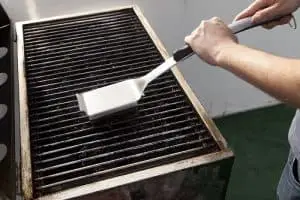
Rust typically encourages the formation of more rust, so getting rid of it completely is highly recommended.
To get started, remove the grates from your grill to prevents the rust flakes from falling into the gas or charcoal pit.
Next, use your tool of choice to brush each side of the grate, and make sure to get in between the crevasses.
If you have stainless steel grill grates, you will have to be gentle to avoid damaging the surface and making the grates more prone to rust in the future.
After you’ve removed all the rust, rinse the grate thoroughly with water to remove all the metallic particles that may be stuck to it, and then air dry.
3. Using Baking Soda
Sodium bicarbonate, commonly known as baking soda is one of the most effective chemicals used to remove surface rust. It removes rust by releasing oxygen as it bubbles, and also serves as a mild abrasive.
When combined with other methods such as steel wool or sandpaper, using baking soda can work miraculously towards removing all the traces of rust from your grill grates.
You first need to prepare a 10:1 baking soda and water paste, or you can use vinegar instead of water for stubborn rust areas.
Apply the paste to the affected areas, and let it rest for roughly 5 – 10 minutes. Grab your steel wool, and apply some pressure to rub the baking soda into the rusted area.
Rinse the area thoroughly with water, and repeat the process if you notice any more rust spots.
4. Using Salt and vinegar
Vinegar is acidic, and salt offers abrasive action, which when combined is effective at removing rust from grill grates, and any other metallic surfaces.
Just like the baking soda method, you have to create a mixture first by mixing two cups of vinegar with one cup of water. When using vinegar and salt, it’s best to soak the grates in the mixture overnight, and you can do this in a large bucket or tank.
After this time is passed, rinse the grates with water. You can use more of this solution along with sandpaper or steel wool to remove any stubborn rust.
If you don’t have any vinegar available, you can squeeze a lime or an orange, and mix the juice with salt to remove rust from your grill grate.
Apart from making french fries and vodka, potatoes can also be used to get rid of rust from grill grates.
Similar to sandpaper, raw potato is an abrasive, and can therefore be used to grind away at the rust on your grill grates.
Potatoes also contain oxalic acid, which is effective at removing rust quickly. Slice a potato in half, and cover the cut section with disk soap. Sprinkle the potato with salt or baking soda, and rub the rusted area with the potato to remove the rust.
5. Using Commercial rust removers
If all the aforementioned solutions to remove rust from grill grates don’t work, your last resort is to try a commercial rust remover, and the good news is that there are plenty to choose from.
When choosing a rust remover, make sure non-toxic, because you will be applying it on your grill grates after all! My choice would be the Evapo-Rust Original Rust Remover.
What Oil do You Use for Grill Grates?
There are many different types of oil you can use for your cooking grates, but most manufacturers recommend using canola or peanut oil.
Oiling your grates prevents food from sticking on it. While your grill is hot, dip a bunched up paper towel into the cooking oil, and carefully wipe the paper down the grill grate.
It is recommended that you oil your grates before and after grilling for best results.
Is it OK to Grill on Rusted Grates?
Surprisingly, the answer is yes! You can grill and eat the food cooked on rusted grates, but for me that seems far some appetizing.
Iron oxide isn’t harmful when ingested in moderation, and even though it won’t affect your health, a regular occurrence could be harmful.
When you consume rust, you’re basically eating iron oxide, and an overdose of iron can lead to death. One of the reasons iron causes harm is owing to the fact that it is a cellular toxin and kills cells through oxidative stress.
Can You Get Tetanus from a Rusty Grill?
Short answer is no, and here’s why! Tetanus is caused by a bacterial infection, so a hot grill will kill, and not allow the bacterium to get to your cooked food.
Tetanus is caused by piercing injuries that introduce Clostridium tetani into the wound such as from getting pricked by a rusty nail.
Which Material Grill Grates Do Not Rust Easily?
Most grill grates are made from stainless steel—a metal that’s impervious to rust. However, the other materials that fall on the grates such as sauces, and even leftover steel wool from cleaning will rust.
This is why it’s a good practice to clean your grill grates before and after each use. And to reiterate, do not use chlorine-based solutions such as bleach to clean your grill grates, because these solutions will break down the film on the stainless steel surface.
